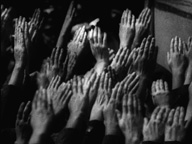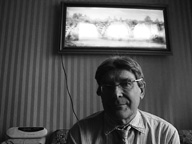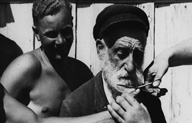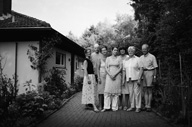Program A Recollections and Records of War
After its defeat, Germany produced numerous films confronting the war that had caused such immense damage. In light of the fact that the number of people alive with direct knowledge of the war has dwindled, now that over sixty years have passed since it ended, how do films face up to Nazism and WWII? What are the possibilities of examining the war with so few traces remaining? How do artists without war experience come to grips with the past? Here we shed light on the various viewpoints and approaches to recollecting and recording the war presented by recent German documentaries.
Eternal Beauty: Vision and Death Wish in the Third Reich
Ewige Schönheit: Vision und Todessehnsucht im Dritten Reich GERMANY / 2003 / German, English / Color, B&W / Video / 91 min / Subtitled in English
GERMANY / 2003 / German, English / Color, B&W / Video / 91 min / Subtitled in English
Director, Script, Producer, Source: Marcel Schwierin
Editing: Christoph Girardet
Narrator: Megan Gay
A visual archive documentary that culls material originally in fiction films and propaganda films produced between 1918 and 1945, and reconstructs it in chronological order in a series of themes. Desire, unrest, and anxiety rise up behind those images in this attempt to clarify the close connection between Nazi Germany and the visual arts.
 Marcel Schwierin
Marcel Schwierin
Filmmaker, curator, and historian, born in 1965. He has directed several experimental films, conducted research on National Socialist aesthetics, and given lectures all over the world. |
 The Fairy Tale of the Little Fish
The Fairy Tale of the Little Fish
Märchen vom Fischlein- GERMANY / 2004 / Russian, English / Color / Video / 84 min / Dubbed and subtitled in English
Director: Wolfgang Reinke
Script: Wolfgang Reinke, Jochen Wisotzki
Photography: Marta Pruska
Editing: Sybille Eckhardt
Producers: Jens Körner, Thomas Riedel, Oliver Niemeier
Production Company, Source: Filmkombinat Nordost
A film about four elderly people who once experienced captivity in concentration camps and forced-labor camps. The camera quietly slides through their respective daily lives spent in contemporary Latvia. More than a simple record of historical testimony, this is also a projection of the overlapping past and present, as we look at the rich personalities of these old people and how they live in the present.
 Wolfgang Reinke
Wolfgang Reinke
Born in 1974 in Güstrow, Wolfgang Reinke has worked as an independent author/director since 2001. His works include Ich wünschte das du hier werst . . . (1998–99), Kan-pai (2002), and Don’t Get Cross with Me (2006). |
 The Unknown Soldier: What Did You Do in the War, Dad?
The Unknown Soldier: What Did You Do in the War, Dad?
Der Unbekannte Soldat- GERMANY / 2006 / German / Color, B&W / 35mm (1:1.85) / 97 min / Subtitled in English
Director, Script, Producer: Michael Verhoeven
Photography: Charles Borniger, Knut Muhsik, Sergej Yemerov, Stefan Schindler, Valentin Kurz
Editing: Gabriele Kröber
Production Company, Source: Sentana Filmproduktion
World Sales: Kinowelt International
 The exhibition Crimes of the German Wehrmacht, which was held in the late nineties, criticized the existing perception that crimes such as the Holocaust were commanded by the Nazis and that the Wehrmacht was not actively involved. Centering around various discussions inspired by that exhibition, this documentary pursues the issues of criminal responsibility of the Wehrmacht and of current perceptions of that history.
The exhibition Crimes of the German Wehrmacht, which was held in the late nineties, criticized the existing perception that crimes such as the Holocaust were commanded by the Nazis and that the Wehrmacht was not actively involved. Centering around various discussions inspired by that exhibition, this documentary pursues the issues of criminal responsibility of the Wehrmacht and of current perceptions of that history.
 Michael Verhoeven
Michael Verhoeven
Born in 1938 in Berlin, Michael Verhoeven appeared in several films, including Julien Duvivier’s Marianne de ma jeunesse (1955). After dual careers as a medical doctor and actor, he turned to filmmaking. He has received numerous international and domestic awards for his films, which include The White Rose (1982) and The Nasty Girl (1990). |
 Winter’s Children
Winter’s Children
Winterkinder- GERMANY / 2005 / German / Color / 35mm (1:1.85) / 99 min / Subtitled in English
Director, Script, Editing, Producer: Jens Schanze
Photography: Börres Weiffenbach
Sound: Mauricio Wells, Mario Köhler
Production Company, Source: Jens Schanze Filmproduktion
How are recollections of war handed down in the closed community of a family? This is a self-documentary by a filmmaker in his thirties, tracing his family’s recollections about his grandfather, who died in 1954. The entire family becomes entangled in clarifying the grandfather’s Nazi connections, which until then had hardly been spoken of.
 Jens Schanze
Jens Schanze
Born in 1971 in Bonn, Jens Schanze studied at the Academy for Television & Film (HFF) in Munich. In 2001, he made his first feature-length documentary, Waste Land (2001). |
